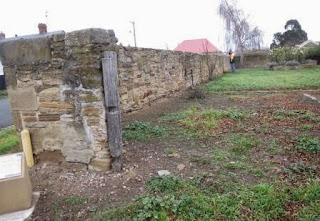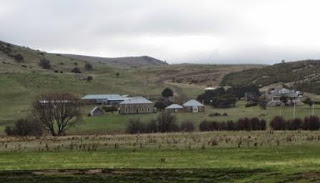Foggy
morning. 9 degrees at 7am in the van. Another overcast day. Did some of the
blog while watching the ducks dive, swans swim and listening to the magpies singing.
After
a cuppa we headed off to explore the Military Precinct. First was the Court
House built in 1829 by 2 convicts from a Chain Gang. It has also been a chapel,
council chambers, mechanics institute and from 1907 it became a family home for
the next 70 years.
Different
stone styles over the years as the building was added onto etc.
Peered
through the window at the stone floor. The ceiling was open rafters but curved.
Very
well worn steps.
The
other side of the building.
The
remaining walls of the Watch House built in 1836.
The
Oatland Gaol was built by convicts between 1834 and 1836. The foundations alone
required over 2000 cart loads of stone. At its maximum the gaol could hold 270
prisoners – the largest regional gaol in Van Diemen’s Land. The walls used to
be 20 feet high but were reduced in 1954. In the gaol yard is the heated
swimming pool now.
The
Gaoler’s Residence – the gaoler and his family lived on the top floor.
Very
worn stairs.
Executions
were held in front of these gates. We noticed on a picture that this archway
was near the Town Hall but obviously they have moved it back to its original
position. Hangman, Solomon Blay, lived for many years at the gaol, sleeping in
the condemned cells. There were 18 men executed here.
Certainly
are thick walls. They are doing the new version of free stone wall as they put
stones in a cage.
The
site of the New Barracks. Steve is reading the info (it was not in good
condition) about the Road Station and Probation Station – Large numbers of convicts
were housed here between 1835 and 1849. Convicts were sentenced to the road
station as punishment for offences committed in the colony, such as
drunkenness, insolence, absconding and petty theft. They were put to work on
the roads, performing hard labour such as breaking stones. In 1844, under the
new probation system, the building was used to house prisoners awaiting private
employment. However, the lack of available work led to great dissatisfaction
among the men and concern amongst authorities, and the station was closed in
1849.
The
site of the Old Barracks then it became the Oatlands State School in 1885.
Info
about the proposed barracks and court house that never happened.
The
gutters are all made from sandstone.
Headed
back into the Callington Mill precinct to check out the old implements we saw
yesterday in the shed. There is another well here they have just put a new
fence around.
Into
the gardens – Steve loves these old gates.
Very
nice place to relax though the cloud is starting to drop its mist on us.
Very
neat sculpture.
Picked
some lavender to sniff as we walked back to the van.
Beautiful
little flowers are appearing on the trees.
Didn’t
notice the shingles on the roof of the stables yesterday.
Had
lunch and put a roast and vegies in the Ecopot for dinner. Headed off for a
drive around the district. Through to Parattah (elevation 460m) which has lots
of colonial weatherboard homes and of course 2 churches in a little town.
Didn’t tell Steve to slow down quick enough to get a photo of the purple
general store.
Lots
of deer and sheep here. The mist is heavy here as we climb higher to 570m to Mt
Seymour.
Though
this little valley is green and clear.
Travelled
down a dirt road along the edge of a hill beside a deep narrow valley till we
crossed the Coal River at 210m.
Crossed
the flat valley with the rolling hills where the sheep keep the pastures so
neat and tidy.
Back
to the Colebrook and then back up to the Midland Highway where we turned left
to head into Jericho to find another Probation Station. Spotted these great
buildings in the distance but I have no info about them.
Crossed
the Jordan River which isn’t much of a river – all fits in why Colebrook used
to be called Jerusalem. Looking at the map though it looks like it flows all
the way down south to Bridgewater and into the Derwent River.
Found
the remains of the Jericho Probation Station, 1841 to 1844. These mud walls are
all that remain of the station which was built to house convicts under the
probation system in 1841. It was in operation until late 1845 when the
buildings were taken over by the roads department and used to house convicts
working on the main road. The buildings were closed in 1848. The Superintendent
lived in the stone house a quarter a mile to the north.
Another
silhouette as we head back onto the main highway.
As
we drove in another entrance to Oatlands we noticed this Pine Tree and both
said, ‘another Lone Pine from Gallipoli’ then we pulled up and yes, that’s what
it was. It is probably the best specimen we have seen.
Footpath,
foundations and house all built from the local sandstone.
Cold
night again so heater on at 5pm. Ecopot Roast and vegies was delicious.
























































No comments:
Post a Comment